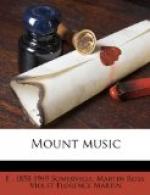“Miss Mangan will kindly do no such thing!” returned that young lady, dealing a flash from between her curled eyelashes that put the naval officer temporarily out of action, so devastating was its effect.
Had not Frederica Coppinger, resting in her club in Dublin, after a severe afternoon with her dentist, some intuition, some spirit-warning, of what was befalling at the home of her ancestors? I believe that those spear-thrusts of nerve-pain that assailed her just before dinner, must have been the result of the wireless summons of distress sent forth to her by her upper-housemaid.
“What next, I wonder, will Master Larry be asking for?” said the upper housemaid to the cook. “The drawing-room carpet pitched into the study, and Miss Coppinger’s own room turned upside down for the riff-raff of Cluhir to be powdering their noses in! ’Haven’t she no powder?’ says they. ‘No matter,’ says the Doctor’s daughter, ’sure I have a book of it in me little bag!’”
“I wouldn’t at all doubt her!” said the cook, saturninely, “But what’s the drawn’-room carpet to conjuring a supper out of me pocket in five minutes? I ask you that, Eliza Hosford!”
None the less, with that deep loyalty to the honour of the house that is a feature in Irish domestic life as wonderful as it is touching, the staff of Coppinger’s Court were resolved that—as they say in China—the face of Master Larry should not be blackened, and The Riff-Raff of Cluhir were served with a ceremony and a success that left nothing to be desired.
Dr. Mangan sat in a very large armchair in front of a big fire of logs, in the hall, and smoked meditatively, and was seemingly quite unaware of the couples who moved past him between the dances, passing out through the open hall-door into the moon-lit May night. He did not even raise an eyelid when his daughter sailed by him, as she did many times, with the ostentation of the young lady who is aware that her prowess is the subject of comment, in company, alternately, with the two captives of her bow and spear who had offered so feeble a resistance to those weapons. Tishy and her father alike ascribed her victory to that redoubtable and already creditably battle-scarred bow and spear; they neither of them recognised the acknowledgments that were due to a certain powerful ally, the May moon. She had stolen up the sky at the back of the woods. The first Larry knew of her was the vast, incredible, pale disc behind the topmost boughs of the pine trees, so near that it seemed to him as though the crooked black branches alone were holding her back, and that her white fire that was pouring through them must consume them, “and then it will be our turn,” he said, seriously, and without preamble, to Tishy.
“Our turn for what?” asked Tishy, very naturally.
“Our turn to be resolved into moonshine. You’ll see me fading away into silver smoke in a minute,” replied Larry. “Let’s get out of this, I’m getting frightened! Hold my hand tight!”




